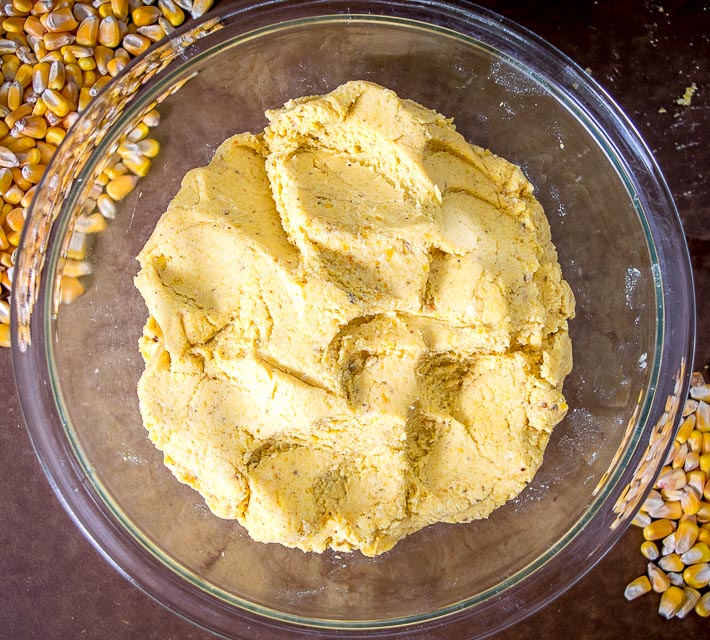Is Corn Masa Gluten Free?

Tortillas and tamales, usually fashioned from maize masa, are two of my favorite foods. But, as a mother of a gluten-free daughter, I’ve been wondering if corn masa contains gluten.
Here’s what I found out after doing some research:
Gluten is not present in corn masa. However, not all masa harina brands are gluten-free certified. Consequently, they may be subjected to cross-contamination with wheat and gluten.
But it’s not quite that straightforward.
While most corn masa is gluten-free, not all corn tortillas or corn masa products are gluten-free. Furthermore, some brands are unconcerned with cross-contamination and may fail to mark their items.
So let’s go a little deeper and take a closer look.
What is gluten, and which foods contain it?
Have you recently received a celiac disease diagnosis?
Maybe your child has a gluten intolerance, which is a whole new world for you. Perhaps a future dinner guest follows a gluten-free diet, and you’re not sure what they’ll be able to eat.
We’ll break it all down and answer all of your burning questions so you’ve come to the right place.
Gluten is a protein combination found in the following foods:
- Wheat is a cereal grain (including wheat types like spelled Kamut, farro, durum, bulgar, and semolina flour)
- Triticale
- Barley
- Rye
- Oats
Whatever brought you here, let’s dispel some common myths about what makes a product genuinely gluten-free and why gluten contamination or cross-contamination is an issue.
Corn is a grass that is high in fiber and helps with digestion. It’s also gluten-free by nature.
What exactly is corn masa?
Maize masa is a dough formed from masa harina, a type of corn flour pounded into masa harina and then steeped in a calcium hydroxide solution known as limewater (not the citrus fruit).
Masa harina, which translates to “dough flour,” is the cornflour used to make masa dough. Masa harina differs from cornmeal in that it is not soaked in limewater.
As a result, masa harina resembles wheat flour in appearance, texture, and feel. On the other hand, cornmeal is grainier and has the same yellow hue as corn.

Masa harina has added niacin and calcium to the ground maize by soaking it in a calcium hydroxide solution. This also affects the flavor of the maize and makes it simpler to digest. That’s also good news for celiac disease or gluten sensitivity sufferers.
Masa harina is often purchased dried and mixed with water to make masa dough.
Aside from texture, another significant distinction between corn masa and cornmeal or grits is that corn masa is often whole grain, meaning the kernel of corn is used. It’s also more nutritious as a result of this.
The endosperm, bran, and germ are frequently removed from cornmeal and some brands of cornflour. The distinction is essentially the same as white and whole wheat flour.
Although masa harina should be naturally gluten-free, I would still recommend buying Maseca, which is specifically branded “gluten-free.”
Is corn or corn masa gluten-free?
Gluten is never added or found naturally in any corn masa product. Corn masa and other corn products do not inherently contain gluten, although they might be contaminated during processing if the company also makes wheat products.
The word “masa” literally translates to “dough.”
Corn masa is a corn-based dough used to prepare tortillas, tamales, and Mexican and Latin American meals.
To make the dough for tortillas, mix masa harina flour with water. Tamales are normally made with flour, lard or shortening, water or broth, and baking powder pinch.
If you’re following a gluten-free diet, you also need to get a certified gluten-free corn masa to verify that it’s free of gluten.
It’s also a great idea to go organic! Corn masa can be acquired fresh if you live in a town with a Latin American, Mexican, or specialty market.
Maseca, a well-known gluten-free masa harina corn flour brand, is well-known.
If you’re like most Americans, you probably have a bag of Maseca in your cupboard right now that you’re not using.
If that is indeed the case, you’re probably wondering if corn masa has an expiration date or how long it lasts. Fortunately, I discuss this in detail in a recent piece regarding masa and how long it takes to deteriorate.
Is masa harina gluten-free cornflour?
Although masa harina maize flour is naturally gluten-free, not all brands are gluten-free. If you have gluten sensitivity, you should only buy gluten-free brands.
Maseca is gluten-free, as I previously said.
That’s the one I buy because it’s also the most readily available, and it’s probably the one you should acquire as well. The following are some other well-known gluten-free brands:
Masabrosa: This gluten-free blue corn masa is made by Masabrosa.
Goya is a gluten-free brand that is similar to Maseca.
Avoid Bob’s Red Mill, which warns on the label that cross-contamination is a possibility.
Other brands, such as Gold Mine and Quaker, don’t say anything either way, but they’re best avoided if you’re being picky.

Is it true that corn tortillas are gluten-free?
Corn tortillas are gluten-free by default. However, cross-contamination can occur if the producer makes flour tortillas or other wheat items. Some tortilla brands also purposefully combine corn and wheat flour. However, this will be clearly stated.
Tortillas are very thin, wrap-like flatbreads that may be prepared with just about any flour but are most commonly made with wheat or cornflour, salt, lard, and water for those of you who aren’t from Texas or Mexico.
The best corn tortillas to buy are those that are certified gluten-free.
Thankfully, they’re readily available at most supermarkets. All corn tortillas made by Mission, a well-known brand, are gluten-free.
There’s even an organic option at Mission. This is the best option because many of Mission’s goods contain hydrogenated oils, aluminum, and bleached flour, not found in organic products.
Other brands that are certified gluten-free that may be slightly harder to come by but can be found in most health food and specialty stores are:
- La Tortilla Factory
- Del Campo
- Guerrero
Of course, there’s nothing like a freshly prepared corn tortilla. They can be quite leathery otherwise. Plus, you’ll know exactly what’s in it if you create it yourself.
Conveniently, one of my recent posts included a step-by-step explanation of how to use a tortilla press.
Is it gluten-free to eat corn tamales?
Corn tamales are naturally gluten-free, although cross-contamination can occur unless the masa is produced using certified gluten-free masa harina corn flour. As a result, always inquire at the restaurant or seek gluten-free product labeling.
Do you see where I’m going with this?
Those labels must be read, read, read!! A tamale is a classic Mexican delicacy composed of maize masa dough and cooked in a corn husk. It can be stuffed with various spicy meats, cheeses, or vegetables.
As we all know, in Texas, the corn husk is not supposed to be eaten and is tossed once on the dish.
Check the label if you’re buying packaged tamales.
Premade Tuscan Tamales, which make a large variety of tamales from Red Chili Beef to Green Chile Chicken and Jalapeno & Cheese to Black Bean & Cheese, are certified gluten-free.
Texas Tamale Company is another option.
They sell spiced tamales made with beef, pig, and chicken. Tamales can even be found in the freezer department of most supermarkets.
Tamale Verde Black Bean, Cheese Tamale Verde, and even a Roasted Vegetable Tamale are frozen from Amy’s Organics. All of the products are gluten-free certified.
Again, if you’re feeling brave, you could be everyone’s favorite dinner host/guest by learning to make your tamales!

Have I addressed all of your concerns about corn masa’s gluten-free status?
Corn is a nutritious and versatile ingredient. That’s especially true when you locate one that’s been lightly processed and is either organic or GMO-free.
When possible, I recommend purchasing GMO-free and organic maize.nIf you’re gluten-free, look for corn goods made by a company that doesn’t manufacture gluten-free items on the same apparatus or in the same facility.
Those will be designated as gluten-free on the front of the label.
Corn is a gluten-free food by nature. However, processed maize does not always imply that the end product is gluten-free.
Gluten-containing grains frequently contact corn in the field or on the conveyor belt, resulting in cross-contamination or gluten contamination.
When following a gluten-free diet, it’s critical to read labels and understand where your corn and other ingredients are grown and processed, just as it is with any food allergy or sensitivity.
Enjoy your meal!











